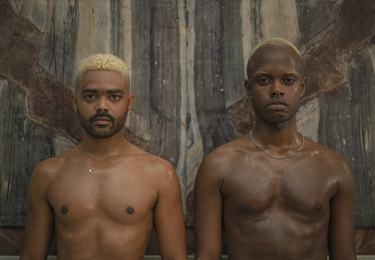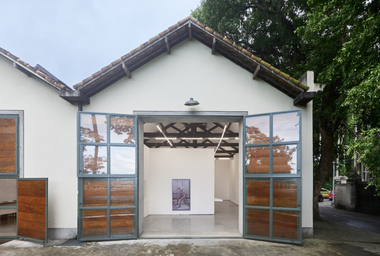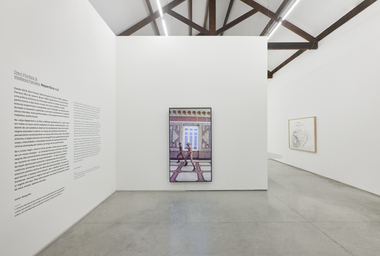
Davi Pontes & Wallace Ferreira
Repertório n. 2
Feb 29 – Apr 27, 2024
Opening
Feb 29, 7 pm–9 pm
Carpintaria
Rua Jardim Botânico 971,
Rio de Janeiro
Directions
Download
Since 2018, Davi Pontes (São Gonçalo, Rio de Janeiro, Brazil, 1990) and Wallace Ferreira (Rio de Janeiro, Brazil, 1993) have developed an artistic practice at the intersection of dance, performance and the visual arts. In their works, the duo executes ingenious choreographies investigating the relationship between duration and exhaustion, repetition and precision, resulting in complex hybrid works frequently registered on video.
The bodily expressions at stake in their works evoke the ideas of theorist André Lepecki, for whom the concept of choreopolitics designates a “profound intertwining of movement, body and place”. In the series Repertório (2018 – ongoing), Pontes and Ferreira collaborate with other agents on photography, soundtrack and art direction to transpose their performances into videos that function as autonomous works.
In Repertório n. 2, shown in video format in Aquário, at Carpintaria, and performed live in a single in loco presentation, Davi and Wallace – as in every other work they have developed as a duo – appear naked before the attentive gaze of the audience. Their two black bodies signal and amplify a range of issues pertaining to contemporary thought in the arts and beyond. The pair executes a choreography that gradually thickens, gaining intensity and speed through an expressive rhythmic harmony arrived at little by little throughout the work.
Dance suddenly presents itself as the entry point for understanding a dense, layered practice that broaches issues related to race to the field of movement and, moving beyond, questions that challenge conventional notions with which ideas of choreography have been understood since modernity.
While, historically, modern dance has instituted an experience in which the public tends to expect grandiose performances and happenings, the minimal and repetitive effort of the artists’ precise steps contradict this notion and result, in the end, in an expanded choreography, capable of bypassing these outdated notions.
As observers, once immersed in their performative rites, we don’t preoccupy ourselves with preconceived notions of beginnings and ends. We are content to follow them and observe their gestures taking over space completely, with no clear way back. The trajectory is a spiral.
If even a still, inert black body still evokes the suspicion of a threatening body – if we are to understand that, even today, black lives are summarily unassisted by the State and victimized by racism in all its dimensions – the pair’s choreographic work point toward possible reframings of collective imaginaries, proving itself beyond an artistic act, as a political exercise around the idea of decoloniality. While blurring the space where they dance, Davi and Wallace refuse the logic with which the Western world was (and is) steered thus far. However, they finally seem to say, emphatically, with their bodies: only this far.
– Victor Gorgulho

